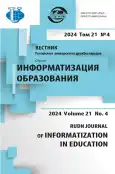Designing the trajectories of variant teaching of the basics of artificial intelligence in the school course of computer science taking into account the possibilities of project-research and extracurricular activities
- Authors: Karakozov S.D.1, Samylkina N.N.1
-
Affiliations:
- Moscow Pedagogical State University
- Issue: Vol 21, No 4 (2024)
- Pages: 448-464
- Section: TEACHING COMPUTER SCIENCE
- URL: https://journal-vniispk.ru/2312-8631/article/view/321357
- DOI: https://doi.org/10.22363/2312-8631-2024-21-4-448-464
- EDN: https://elibrary.ru/SJSRYC
- ID: 321357
Cite item
Full Text
Abstract
Problem statement . The mandatory study of the basics of artificial intelligence and data analysis in general education course of informatics is a significant innovation that requires adjusting methodological system of teaching informatics at school. The article presents the results of research on the problem of designing trajectories of variant teaching of the basics of artificial intelligence and data analysis in the course of computer science of basic general and secondary general education in accordance with the requirements of the updated FSES of general education on the basis of current methodological approaches, taking into account the possibilities of project-research and extracurricular activities. Methodology. Theoretical methods of research were used: analysis of scientific publications on the subject of artificial intelligence and data analysis, analysis and comparison of materials of foreign educational standards of different levels of education, review of domestic practices of implementation of the results of pedagogical research on the methodology of teaching computer science on the basis of integrative methodological approach. Results. On the basis of the proposed components of the methodology of teaching artificial intelligence basics and data analysis, the possibilities of designing different learning trajectories in accordance with personal requests of participants of educational relations, as well as for the rational use of resources of the information educational environment of the organization in the implementation of basic educational programs of general education are shown. Conclusion. Designing trajectories of variant teaching of the basics of artificial intelligence in the school course of computer science, taking into account the possibilities of project-research and extracurricular activities, allows to optimize needs of students and resources of educational organizations.
About the authors
Sergey D. Karakozov
Moscow Pedagogical State University
Email: sd.karakozov@mpgu.su
ORCID iD: 0000-0001-8151-8108
SPIN-code: 7462-2637
Doctor of Pedagogical Sciences, Professor, Director of the Institute of Mathematics and Informatics
1 Malaya Pirogovskaya St, Moscow, 119435, Russian FederationNadezhda N. Samylkina
Moscow Pedagogical State University
Author for correspondence.
Email: nsamylkina@yandex.ru
ORCID iD: 0000-0003-0797-5532
SPIN-code: 5599-8846
Doctor of Pedagogical Sciences, Associate Professor, Professor at the Department of Theory and Methodology of Informatics Education, Institute of Mathematics and Informatics
1 Malaya Pirogovskaya St, Moscow, 119435, Russian FederationReferences
- Samylkina NN. Organization of advanced training in informatics on the basis of integrative approach: monograph. Moscow: Moscow Pedagogical State University; 2020. (In Russ.)
- Grigoriev SG, Kalinin IA, Samylkina NN. The task system for the first All-Russian Olympiad in artificial intelligence for schoolchildren. Informatics and Education. 2022;37(3):12–20. (In Russ.) https://doi.org/10.32517/0234-0453-2022-37-3-12-20
- Roy D, Dutta M. A systematic review and research perspective on recommender systems. Journal of Big Data. 2022;9. https://doi.org/10.1186/s40537-022-00592-5
- He Q, Li X, Cai B. Graph neural network recommendation algorithm based on improved dual tower model. Scientific Reports. 2024;14. https://doi.org/10.1038/s41598-024-54376-3
- Broussard M. Artificial intelligence: limits of the possible. Trans. from English by Arye E. Moscow: Alpina non-fiction; 2020. (In Russ.)
- Kornev MS. History of Big Data: dictionaries, scientific and business periodicals. Bulletin of Russian State University for Humanities. Series: History. Philology. Cultural Studies. Oriental Studies. 2018;1(34):81–85. (In Russ.) https://doi.org/10.28995/20736355-2018-1-81-85
- Salij VV, Kuharenko LV, Ishchenko OV. Digital transformation of the economy and implementation of big data storage in company infrastructure. Bulletin of the Academy of Knowledge. 2021;3(44):208–214. (In Russ.) https://doi.org/10.24412/2304-61392021-11240
- Menshchikov AA, Perfilyev VE, Fedosenko MYu, Fabziev IR. The main problems of using Big Data in modern information systems. Stolypin’s Bulletin. 2022;1:316–329. (In Russ.)
- Egorov VB. Some issues of software-defined datacenters. Systems and Means of Informatics. 2020;30(2):103–112. (In Russ.) https://doi.org/10.14357/08696527200210
- Samylkina NN, Salakhova AA. Teaching the basics of artificial intelligence and data analysis in the course of computer science at the level of secondary general education: monograph. Moscow: Moscow Pedagogical State University; 2022. (In Russ.) https://doi.org/10.31862/9785426310643
- Levchenko IV, Sadykova AR, Merenkova PA. A model of variant teaching for basic school students in the field of artificial intelligence. Informatics and Education. 2024;39(2):16–24. (In Russ.) https://doi.org/10.32517/0234-0453-2024-39-2-16-24
- Lee SJ, Kwon K. A systematic review of AI education in K-12 classrooms from 2018 to 2023. Topics, strategies, and learning outcomes. Computers and Education: Artificial Intelligence. 2024;6. https://doi.org/10.1016/j.caeai.2024.100211
- Hazzan O, Ragonis N, Lapidot T. Data science and computer science education. In: Guide to teaching computer science: An activity-based approach. 3rd ed. Springer; 2020. p. 95–117. https://doi.org/10.1007/978-3-030-39360-1_6
- Foundations of data science for students in grades K-12: Proceedings of a workshop. Washington: National Academies Press; 2023. https://doi.org/10.17226/26852
- Israel-Fishelson R, Moon PF, Tabak R, Weintrop D. Preparing students to meet their data: an evaluation of K-12 data science tools. Behaviour & Information Technology. 2023;1–20. https://doi.org/10.1080/0144929X.2023.2295956
- Tkach TV. Machine learning and Big Data processing in a modern school. Informatics in School. 2020;7(160):25–29. (In Russ.) https://doi.org/10.32517/2221-19932020-19-7-25-29
Supplementary files









